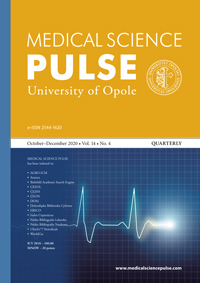College students’ attitudes towards prohealth behavior and alcohol consumption during pregnancy planning and pregnancy.
College students’ attitudes towards prohealth behavior and alcohol consumption during pregnancy planning and pregnancy.
Author(s): Katarzyna Szwamel, Małgorzata Szerszeń, Joanna Siekierka, Agnieszka KotowskaSubject(s): Health and medicine and law
Published by: Uniwersytet Opolski
Keywords: health behavior; fetal alcohol syndrome; alcohol drinking
Summary/Abstract: Background: Alcohol is one of the most commonly used psychoactive substances among students. Aim of the study: This study aimed to examine the level of pro-health behaviors among college students, and their opinions on alcohol consumption during pregnancy planning and pregnancy. Material and methods: This study was conducted in 2018 among 228 adult students in Opole secondary schools. Diagnostic surveys were used, which included the Health Behavior Inventory (HBI) and a questionnaire developed by the authors. Results: Forty-six percent (n = 105) of the 228 students presented with very low levels of pro-health behaviors and 57.46% (n = 131) of students endorsed alcohol intoxication or abuse in the past. Most of the students (n = 215; 94.3%) claimed that a baby’s father should have an impact on pro-health behaviors of his pregnant female partner. There were, however, divergent opinions on the permissibility of alcohol consumption by a mother-to-be and a potential father while planning to become pregnant. The students were more likely to report that drinking is acceptable among potential fathers as compared to mothers (35.52% vs. 22.37%). Students also pointed out the need to spread knowledge about fetal alcohol Syndrome (FAS). Finally, students reported that their families and teachers were the best sources of knowledge on the potential harmful effects of alcohol, including FAS. Conclusions: There is high accessibility and social acceptance of alcohol consumption, in conjunction with low and average levels of pro-health behaviors among most young adults. Further, most young adults have experienced alcohol intoxication or abuse in the past and the opinions on the acceptance of alcohol consumption by potential fathers and mothers while planning a baby. Together, these patterns may be associated with an increased risk of FAS. The students pointed to a strong need for more information about FAS, and indicated that their families and schools as the most desired sources of this information. These results may can be used to create an educational strategy for students aimed at FAS prophylaxis.
Journal: Medical Science Pulse
- Issue Year: 14/2020
- Issue No: 4
- Page Range: 49-59
- Page Count: 11
- Language: English

